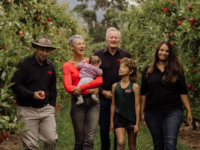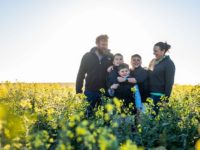Having fought her own cancer battle, Alyx Stewart created a range of recipes that are palatable and nourishing for those struggling to eat well due to the illness, and last month she expanded her remit to offer help on every aspect of nutrition for cancer patients by launching her Centre For Cancer Nutrition.
What was the inspiration for originally founding Kee-moh Snacks?
My own cancer experience was at the heart of the inspiration for Kee-moh Snacks. During chemo, my side effects severely limited my eating, and my husband and I struggled with finding food I could eat, and keep down. I was also drowning in flowers from friends. Flowers, flowers, and more flowers. The sentiment, care, and support behind the flowers was beautiful but they didn’t actually physically help me.
I wanted to create a gift box that someone could give a friend with cancer that was full of snack items they could eat to be nourished and nurtured, regardless of chemo side-effects they may be experiencing. Something that was both practical and from the heart.
And what drove you to diversify and create the Centre For Cancer Nutrition?
I understood from my own experience with treatment-related malnutrition that help and advice with overcoming this is very difficult to find, and it is not in the one place. Studies show up to 80 per cent of cancer patients suffer some form of malnutrition during their treatment. I see the same questions every day in support forums about how difficult it is to eat with side effects and asking where to go for help. This is why I diversified to create Centre For Cancer Nutrition.
Whilst lots of people are aware there are many side-effects of cancer treatment, the most obvious of which can be hair loss, the hidden side-effect from cancer treatment is malnutrition. Cancer-related malnutrition results from “hidden” side-effects, like a dry mouth which leaves people feeling like they are eating the desert so these people need hydrating and moist foods. Some have a very sore mouth, so they need soft gentle food. Taste changes severely alter the enjoyment of food and not eating is often the only option – hence the malnutrition.
When we lose our enjoyment of food, we lose our connection with family and friends because we can no longer participate in the sharing of a meal together. We use food to celebrate and to console. The missing pieces of the cancer puzzle related to practical information about how to tweak and adapt food and ingredients so someone with side-effects can still enjoy their favourite meals. This is what drove me to create Centre For Cancer Nutrition.
What has been the biggest challenge in transitioning your business into this expanded scope, and how did you overcome it?
After starting with my trusty whiteboard and sticky notes and not holding back on my full vision, I mapped out everything I wanted to see in the expanded business. The amount of information going into the expanded business is huge to the point of being overwhelming. The challenge has been knowing where to start.
I identified how all the new information would make sense to someone visiting the site. There’s no point in starting with a “module” that didn’t seem to fit with the information on the site. I decided it had to be congruous with what was already available and started to integrate information from that starting point so that anyone coming to us could find what they needed easily, simply and intuitively.
What is your vision for the development of the business in the next couple of years?
Like many small-business owners, my vision is so big that it actually scares me and excites me in equal measure! The big picture is to be recognised as the leading global resource hub for everything cancer nutrition and malnutrition-related. To get there requires visibility (people have to know we exist), accessibility (ensure everyone has easy access to us), and collaboration with experts in many fields to ensure our message is well grounded in science, nutrition, and leading cancer research.
And, finally, what is the #1 lesson you’ve learned on your journey you’d share with others looking to start their own business?
The original vision for your business may not be your final one. Evolution really is the key to growth. Even if you have started on one path, doesn’t mean you can’t change it. Be in tune with where your business is telling you to go, what the market needs, and follow that. I have a saying, “Sometimes life guides us to where we will be the most impactful or where we will be most fulfilled. Sometimes, that is the same place.” I encourage all business owners to search for whatever that ‘place’ is for them. It’s definitely worth it!
This interview was originally published by our sister title Inside Small Business.

















